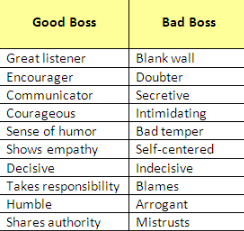In my coaching and psychotherapy practice, I frequently see employees that are demoralized by their working environment. Particularly, by their manager or supervisor. Typically, the feelings of lack of worth, value, recognition and validation are the most common complaints. So, what is really the problem? What is going on that many employees feel so bad about their workplace? It may be time to take a look at your current situation. A manager that doesn’t have boundaries expects you to be available to work nights and weekends, is a micromanager, has such high expectations that you can’t possibly meet them creates dissatisfaction in the workplace. Consequently, you can become so stressed, feel so disenchanted that your productivity falls. Once you psychologically disconnect, it may be difficult to get up in the morning to go to work, enjoy the workplace or even eventually cause you to quit. Take a look at the qualities described on the Good Boss/Bad Boss list. Once you better understand what you are up against, you can plan some strategies to manage your situation.
These statistics are rather unsettling. Nearly half of employees believe their boss is unreasonable. What not to do?
- Be passive
- Be defensive
- Be quiet about your unhappiness
- Gossip
- Complain
What to do!
- Be positive
- Focus on alignment with your boss
- Communicate your needs
- Ask for feedback
- Get a mentor
- Do not tolerate Bullying
- Keep incident records of problem behavior
- Get coaching
- Talk with your EAP
If the situation is impossible, you are miserable, you will have to find a way to leave the department or the company. Some corporate cultures are better than others. Change is difficult, but inevitable, so embrace it. Take change of yourself by getting more training, certifications, education to help improve the quality of your life.






